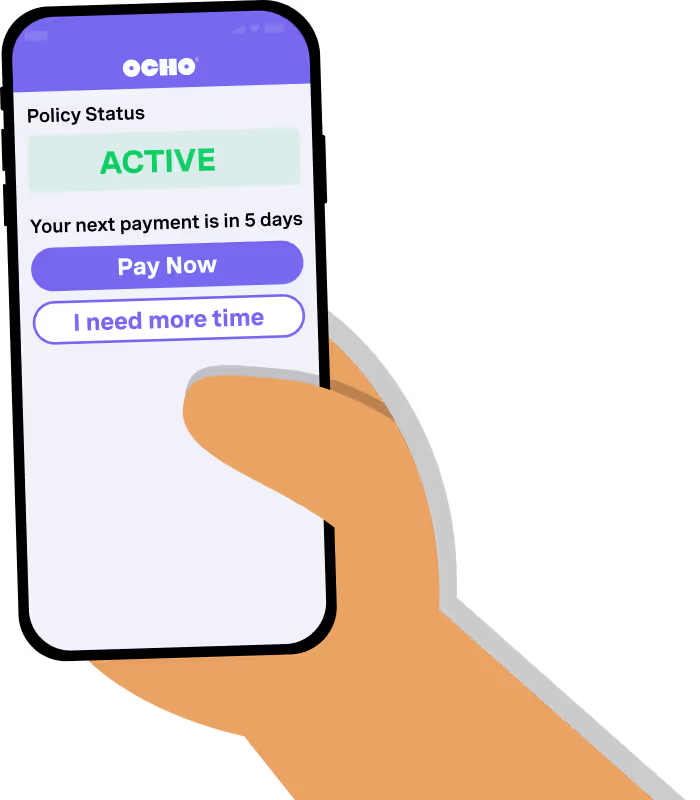
Your car suddenly breaks down or gets damaged in a storm—will your insurance help with repairs? This is a common question many drivers face, especially when unexpected car problems arise. The answer depends on several factors, including what caused the damage and what type of coverage you have. 💼
At OCHO, we believe in explaining insurance without the confusing jargon. Let's break down exactly what car insurance typically covers when it comes to repairs, and what it doesn't.
Car insurance doesn't cover all repairs in all situations. Instead, whether your repairs are covered depends on:
Ocho says, "Many drivers assume their insurance covers all repairs, only to discover the hard way that basic liability policies don't cover their own vehicle's damage!"
Let's look at different scenarios and coverage types to understand what repairs might be covered:
Collision coverage helps pay for repairs to your vehicle when you're involved in an accident, regardless of who's at fault. This includes:
If you have collision coverage and get into an accident, your insurance will cover repairs to your vehicle after you pay your deductible. This is true even if you were at fault for the accident.
However, if another driver caused the accident, their liability insurance should cover your repairs. In that case, you might not need to use your collision coverage or pay a deductible.
Comprehensive coverage handles repairs for damage caused by events other than collisions, such as:
For example, if your car suffers hail damage, comprehensive coverage would help pay for repairs after you meet your deductible. Without comprehensive coverage, you'd be responsible for the full repair cost.
Some policies include specific coverage for glass repairs, which can include:
In some states, windshield repairs might even be covered without a deductible. This varies by state and insurance provider, so it's worth checking your policy details.
Just as important as knowing what's covered is understanding what's not covered by typical auto insurance:
Standard car insurance doesn't cover:
These types of repairs fall under normal wear and tear or mechanical failures, which aren't considered "sudden and accidental" events that insurance is designed to cover.
If you've modified your car with custom parts or equipment, standard insurance may not cover repairs to these modifications unless you've purchased special coverage for them. This includes:
Insurance won't cover repairs for damage that existed before you purchased the policy. This includes:
Hail damage is one of the most common types of weather-related car repairs. The short answer is yes, car insurance does cover hail damage—but only if you have comprehensive coverage.
Hail can cause significant damage to your vehicle, including:
Without comprehensive coverage, you'd be responsible for 100% of these repair costs out of pocket. With coverage, you'd only pay your deductible and insurance would cover the rest.
If you live in areas prone to severe weather like Texas, having comprehensive coverage is especially important. Learn more about Texas car insurance requirements and recommendations.
Your deductible plays a major role in how insurance covers repairs. This is the amount you agree to pay before your insurance kicks in. For example:
Choosing a higher deductible typically lowers your premium, but means you'll pay more out-of-pocket when you need repairs. If you're on a tight budget, this tradeoff is important to consider.
OCHO offers flexible payment plans that can make comprehensive and collision coverage more affordable, even with lower deductibles that provide better protection.
Many drivers worry about rate increases after filing a claim for repairs. Here's what you should know:
Before filing a small claim, consider whether the repair cost minus your deductible is worth the potential rate increase.
If your car needs repairs after a covered incident, follow these steps:
Need transportation while your car is being repaired? Learn if insurance will pay for a rental car during repairs in our comprehensive guide.
While liability insurance is legally required in most states, collision and comprehensive coverages are optional. Here's why they're worth considering:
Many drivers skip these coverages to save money, but this can be a costly decision if something happens to your vehicle. OCHO offers no deposit car insurance and zero down car insurance options that make these valuable coverages more accessible.
Sometimes damage is so extensive that repairs would cost more than the car is worth. In these cases:
This is where having the right coverage really matters—without comprehensive or collision coverage, you'd receive nothing for a totaled car unless another driver was at fault.
At OCHO, we understand that unexpected repairs can be financially devastating for families living paycheck to paycheck. That's why we offer options that make comprehensive insurance coverage more accessible:
Align your insurance payments with your paycheck schedule, making it easier to maintain continuous coverage.
Get fully covered without a large upfront payment, removing a common barrier to comprehensive coverage.
Customize your payment schedule to fit your budget, helping you maintain the coverage you need.
Not all insurance policies are created equal when it comes to repair coverage. Use our car insurance calculator to see how different coverage options affect your premium and protection levels.
Does car insurance cover repairs? Now you know: it depends on what caused the damage and what coverage you have. The right insurance policy can protect both your vehicle and your financial well-being.
At OCHO, we believe everyone deserves access to insurance that truly protects them, with payment terms that fit their budget. Don't wait until after damage occurs to discover what your policy covers.
Ready to get proper coverage that protects your car from repair costs? Get a free quote from OCHO today and discover how affordable comprehensive coverage can be with our flexible payment options.
Compare & get covered fast
Find and compare auto insurance in minutes, and get your free credit score.
Choose when you pay
Select payment dates that line up with your payday.
Manage everything in one place
Track your policy, manage payments, and request a payment extension right from your dashboard.
